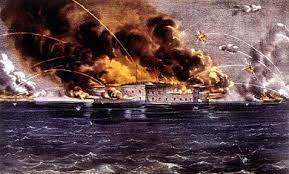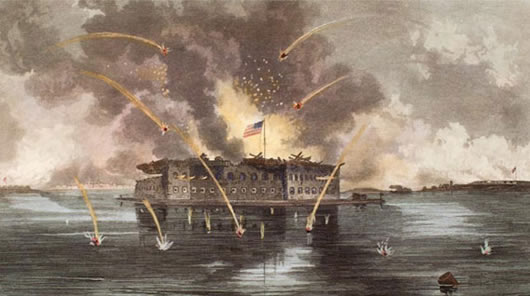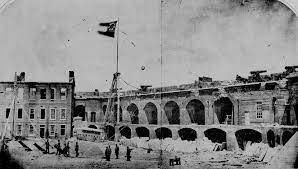History can be concealed by just ignoring it, or another tricky way is to make it nearly impossible to engage in an adult conversation about it. I’m referring to our Civil War. If an adult in this country even tries to discuss anything beyond the standard group think thoughts of the “war was fought to free the slaves or the south was bad” then that person is more than likely bound to be labeled a racist! Thomas DiLorenzo has stated that, “Today it is typical for Americans to express the view that Lincoln ”proved” that secession is illegal and that the American union is not and never was voluntary. If one disagrees with this by pointing out plain historical facts, one likely to be libeled as a racist or a slavery defender. This is now how Lincoln’s might-makes-right theory of the American found is enforced.” DiLorenzo, Thomas J., The Problem with Lincoln, Regnery History, 2020, page 113.

We need to be able to talk about the War for Southern Independence to learn how this country was changed from a country that was founded on being a Constitutional-Republic Federal Government with limited powers to a consolidated government which is federal in name only. A government that has mushroomed way beyond it’s intended size and reach. It’s more of a Mobocracy where the constitution is just given lip service. Most of this change occurred because of our Civil War, which I will more accurately describe as the War for Southern Independence.

Most wars are fought over money (resources, taxes) and/or power (self-determination). I will list some of the facts that are typically left out of the main-stream or government-run educational sources about the War for Southern Independence;
• Cause for South Carolina Succession was Slavery, which was done on December 20, 1860.
• War was fought to Save the Union – “If I could save the union without freeing any slaves I would do it; and if I could save it by freeing all the slaves I would do it; and if I could save it by freeing some and leaving others alone I would also do that.” Lincoln letter to Horace Greeley August 22, 1862
o Why Save the Union? If the South left the Union, the Federal Government residing in the North would lose 75% of its tax income (from imports/exports) which came from the South. One historian, Leonard M. Scruffs, even put this amount at a higher 95%. Mitcham Jr., Samuel W., It Wasn’t About Slavery, Exposing the Great Lie of the Civil War, Regnery History,2020 page 113, note 8 Scruggs, “The Morrill Tariff.”137
o The new South would have had a much lower tariff (10%) so shipping would move to the south away from northern ports, so the North (Morrill Tariff 47%) would lose this shipping traffic. The North would be economically devastated. The West was opening at this time in history and the shipping traffic would come from the South instead. (Refer to the Confederate Constitution for tariff percentage.)
• The export value of cotton alone in 1859 was $161,000,000 and the value of all exports from the North was only $78,000,000 or about half the value of the South. Mitcham, page 113 note 6 Lyon G. Tyler, A Confederate Catechism (Athens, Georgia: 1935), 6.
• A couple days after South Carolina’s succession President-elect Lincoln writes the following letter, where he restates the reason for South Carolina’s succession – slavery.
To Alexander H. Stephens, For your own eyes only.
Hon. A. H. Stephens – Springfield, Ills., Dec. 22, 1860
My dear Sir ,
Your obliging answer to my short note is just received, and for which please accept my thanks. I fully appreciate the present peril the country is in, and the weight of responsibility on me.
Do the people of the South really entertain fears that a Republican administration would, directly, or indirectly, interfere with their slaves, or with them, about their slaves? If they do, I wish to assure you, as once a friend, and still, I hope, not an enemy, that there is no cause for such fears.
The South would be in no more danger in this respect, than it was in the days of Washington. I suppose, however, this does not meet the case. You think slavery is right and ought to be extended; while we think it is wrong and ought to be restricted. That I suppose is the rub. It certainly is the only substantial difference between us. Yours very truly.

• One reason for not allowing slavery in the new territories was racial in nature – preventing black people from spreading into the new territories. Besides the obvious racial white supremacy reason, there was also the concern of black labor competing with white labor. In Mitcham’s book he states, “the prohibition of slavery in the territories to stop the spread of black people.” Mitcham, Samuel W.. It Wasn’t About Slavery: Exposing the Great Lie of the Civil War (p. 121). Regnery History. Kindle Edition.
• President-elect Lincoln indicates he will not waiver from collecting the revenue.
To James W. Webb
Private
Col. J. W. Webb. Springfield Ills.
My dear Sir, Dec. 29, 1860
Yours kindly seeking my view as to the proper mode o dealing with the succession, was received several days ago, but, for want of time I could not answer it till now. I think we should hold the forts, or retake then, as the case may be, and collect the revenue. We shall have to forego the use of the federal courts, and they that of the mails, for a while. We can not fight them in to holding courts, or receiving the mails.
This is an outline of my view; and perhaps suggests sufficiently, the whole of it. Yours very truly.

• From President Lincoln’s First Inaugural Address he states the following, “. . . . In doing this there needs to be no bloodshed or violence, and there shall be none unless it be forced upon the national authority. The power confided to me will be used to hold, occupy, and possess the property and places belonging to the Government and to collect the duties and imposts; but beyond what may be necessary for these objects, there will be no invasion, no using of force against or among the people anywhere.” First Inaugural Address of Abraham Lincoln, March 4, 1861. Implies the use of force to collect the duties and imposts, and indicates force will be used if used against it.
• North was replenishing Fort Pickens located in the South after the South had succeeded, and act of aggression. Johnstone, H.W., Truth of the War Conspiracy of 1861, The Scuppernong Press, Edited by Frank B. Powell, III, 2012
• The North invaded the South. The South did not try to overthrow the Northern government. (That would have been a Civil War, which never occurred.) The South left peaceably. First shot fired by South (no one was hurt) after North invaded South. South was provoked into firing.
..A few days later, Lincoln consoled Captain Fox for his failure to reach and relieve the fort, by writing: “ You and I both anticipated that the course of the country would be advanced by making the attempt to provision Fort Sumter, even if it should fail; and it is no small consolation now to feel that our anticipation is justified by the result.”23 Not long after this letter was written, he boasted to his friend Orville H. Browning that:”. . . He himself conceived the idea, and proposed sending supplies, without an attempt to reinforce giving notice to Gov. Pickens of S.C. The plan succeeded. They attack Sumter – it fell, and thus, did more service than it otherwise could.” 24 From Craven, Avery, The Coming of the Civil War, The University of Chicago Press, 1942, 1974 pages 437-438, (23) Crawford, Genesis of the Civil War, 404, (24) The Diary of Orville H. Browning (Pease and Randall ed.), I, 475-476.
• The Emancipation Proclamation was a war measure made two years into the war and specifically didn’t free any slaves held in the Union-controlled areas. Read the last paragraph of the proclamation to see areas excluded from freeing slaves in the Union-controlled areas.
• The pro-Lincoln New York Evening Post pointed out on March 12, 1861, that if the government could not collect revenues from the seceded states, “the nation would become bankrupt.”27 Mitcham, page 119 (27) Howard Cecil Perkins, ed. Northern Editorials on Secession (Gloucester, Massachusetts: 1964, Vol I, 335. Pager 598-599
• Lincoln’s white supremacist view of the Negro. “I will say then that I am not, nor ever have been, in favor of bringing about, in any way, the social and political equality of the white and black races; that I am not, nor ever have been, in favor of making voters or jurors of negroes, nor of qualifying them to hold office, no0r to inter-marry with the white 9people’ and I will say in addition to this that there is a physical difference between the white and black races which I believe will forever forbid the two races living together on terms of social and political equality.” From the Lincoln-Douglas debate at Charleston, Illinois, on September 18, 1858.
• “Succession was unquestionably the cause of the Civil War. It is the thesis of this chapter that taxation was the most significant factor on both sides. Southern slavery was to be tolerated by the North; Southern free ports were not. The war was caused when Southern hotheads bombarded a federal fort in Charleston harbor. The war was also caused when Lincoln decided to put down this rebellion with military force. But behind these acts of violence and succession itself was a tax issue neither side would compromise on. Freedom from oppressive taxation had caused the American Revolution, the French Revolution, and throughout history revolts and rebellions too numerous to mention. The War of the Rebellion, as it was officially called, had at its core what has been at the core of most rebellions from our earliest historical records.” ”Adams, Charles, For Good and Anvil, Madison Books,1993, page 337
